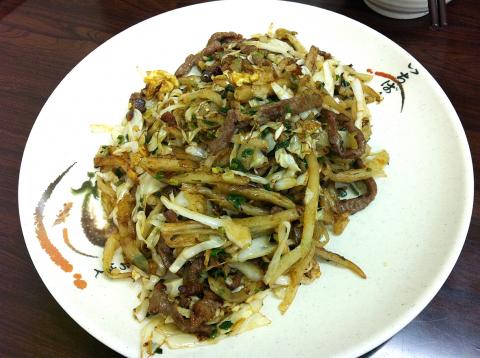Fans of daoxiaomian, or knife-cut noodles, will want to add 93 Taohsiaomien (93刀削麵館) to their list of places to go. This small and clean shop, located a block behind the Sheraton Hotel on Zhongxiao East Road Section 1 (忠孝東路一段) in Taipei, is a reliable neighborhood standby for northern Chinese-style noodle dishes, boiled dumplings and scallion pancakes.
It’s hard to go wrong with 93’s specialty, tomato broth beef noodles (番茄牛肉麵, NT$120), though I prefer the plain tomato soup noodles (番茄麵, NT$80), which hits the spot for taste and texture. The tomato broth is tangy with a hint of sweetness, while the knife-cut noodles are thick and have the “QQ,” or chewy, firm texture that lovers of this Shanxi staple will appreciate. Have a bowl with a fried pork chop instead of beef (番茄排骨麵, NT$120) or go all out and have tomato and beef broth with pork chop (番茄牛湯排骨麵) for NT$130.
If this sounds too hearty for summer, you can always replace the knife-cut noodles with rice noodles (冬粉) at the same cost, or do without the soup. 93 offers a respectable version of the classic moo-shu stir-fried noodles (木須炒麵, NT$85), which is made with the standard ingredients, including scrambled egg and “wood ear” mushroom. Add pork to the mix for an additional NT$50, or beef for an additional NT$10.

Photo: David Chen, Taipei Times
The stir-fried noodles are only available at dinnertime and Saturday lunch, but for non-soup options, there’s always zhajiang mian, literally “fried sauce noodles” (炸醬麵, NT$60).
The typical Shanxi-style noodle joint in Taipei is usually a rundown affair, with the cook stationed at the shop front, whittling away at a block of dough, as chunks of noodles fly into a vat of boiling water. You won’t find this novelty at 93, which has a typically drab, but squeaky clean interior, complete with fluorescent lights and a flatscreen TV on the wall. It seems well-suited to the clientele. You’ll see moms with kids in tow, stopping in for a quick after-school dinner, as well as civil servants and staff workers from the nearby Executive Yuan, who stand out with their neatly pressed black slacks, short-sleeve white button-down shirts and black loafers.
Another reason to come to 93 is the shop’s tasty scallion pancakes (蔥油餅, NT$30), which are made fresh from scratch. An order paired with tomato soup (NT$55), the same broth used in the noodle soups, makes for a nice light meal for one.
The restaurant also offers a dish you don’t often see at beef noodle shops: chaobing (炒餅) is like a noodle stir-fry except that the noodles are replaced with scallion pancake sliced into thin strips. The polite waitresses will warn you the dish takes a bit longer to prepare, but it’s worth the wait.
At NT$95, the chaobing with chopped beef (牛肉炒餅) is a great deal for a filling meal. A friend of mine who goes there regularly thinks the shop should be charging NT$20 more for it. He thinks it’s that good; I like it but find it a tad too salty. A vegetable chaobing (蔬菜炒餅, NT$85), which comes stir-fried with cabbage and scrambled egg, is equally satisfying. This dish is only available in the evenings and for Saturday lunches.
One last recommendation: If you get a cold appetizer (NT$20), go for the chopped eggplant, which is fried to a light, crispy golden brown, chilled and then served with a delicious garlic soy sauce.

Towering high above Taiwan’s capital city at 508 meters, Taipei 101 dominates the skyline. The earthquake-proof skyscraper of steel and glass has captured the imagination of professional rock climber Alex Honnold for more than a decade. Tomorrow morning, he will climb it in his signature free solo style — without ropes or protective equipment. And Netflix will broadcast it — live. The event’s announcement has drawn both excitement and trepidation, as well as some concerns over the ethical implications of attempting such a high-risk endeavor on live broadcast. Many have questioned Honnold’s desire to continues his free-solo climbs now that he’s a

Francis William White, an Englishman who late in the 1860s served as Commissioner of the Imperial Customs Service in Tainan, published the tale of a jaunt he took one winter in 1868: A visit to the interior of south Formosa (1870). White’s journey took him into the mountains, where he mused on the difficult terrain and the ease with which his little group could be ambushed in the crags and dense vegetation. At one point he stays at the house of a local near a stream on the border of indigenous territory: “Their matchlocks, which were kept in excellent order,

Jan. 19 to Jan. 25 In 1933, an all-star team of musicians and lyricists began shaping a new sound. The person who brought them together was Chen Chun-yu (陳君玉), head of Columbia Records’ arts department. Tasked with creating Taiwanese “pop music,” they released hit after hit that year, with Chen contributing lyrics to several of the songs himself. Many figures from that group, including composer Teng Yu-hsien (鄧雨賢), vocalist Chun-chun (純純, Sun-sun in Taiwanese) and lyricist Lee Lin-chiu (李臨秋) remain well-known today, particularly for the famous classic Longing for the Spring Breeze (望春風). Chen, however, is not a name

There is no question that Tyrannosaurus rex got big. In fact, this fearsome dinosaur may have been Earth’s most massive land predator of all time. But the question of how quickly T. rex achieved its maximum size has been a matter of debate. A new study examining bone tissue microstructure in the leg bones of 17 fossil specimens concludes that Tyrannosaurus took about 40 years to reach its maximum size of roughly 8 tons, some 15 years more than previously estimated. As part of the study, the researchers identified previously unknown growth marks in these bones that could be seen only